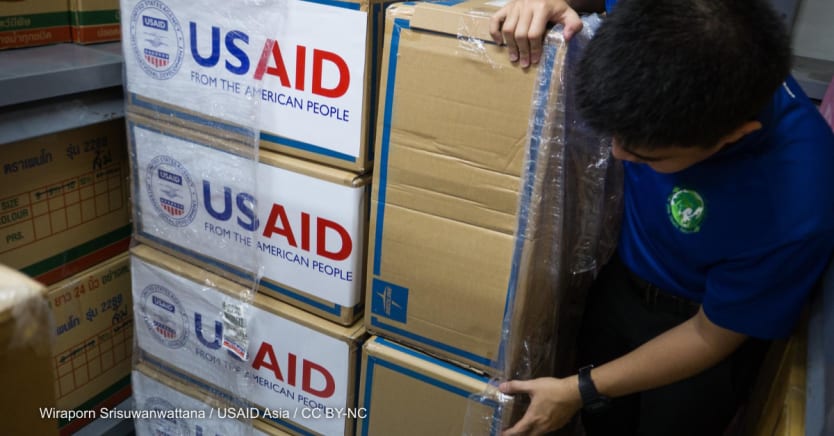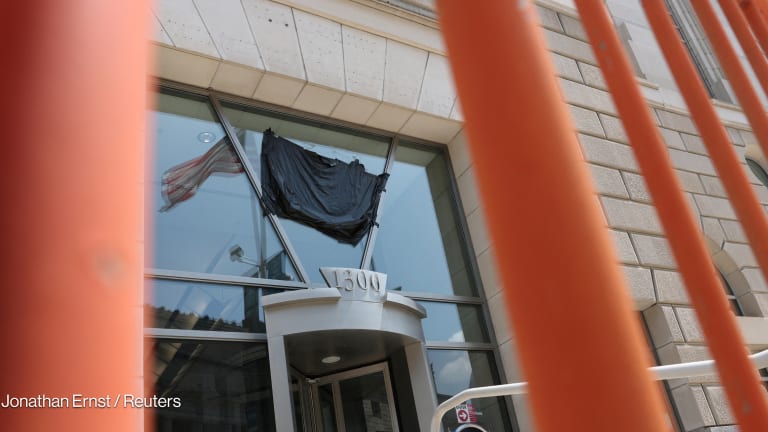
The Trump administration has less than 12 hours to restore millions of dollars in foreign assistance — but in a court statement filed on Wednesday, the government said it will terminate nearly 10,000 awards instead.
“USAID is in the process of processing termination letters with the goal to reach substantial completion within the next 24-48 hours,” the administration stated in a court document, which was filed this afternoon. “As a result, no USAID or State obligations remain in a suspended or paused state.”
The awards slated for termination include 5,800 from the U.S. Agency for International Development and 4,100 from the State Department, many of which had already been granted waivers to provide lifesaving humanitarian aid, several sources told Devex.
In Wednesday’s court filing, the Trump administration said that Secretary of State Marco Rubio had “individually reviewed” all previously terminated programs, and determined that doing so was in the country’s national interest. Within hours, organizations across the world began receiving termination emails from Adam Cox, the agency’s deputy director in the Office of Acquisition and Assistance — some in the double digits.
“Defendants moved quickly to conduct ‘a good-faith, individualized assessment of [each] contract or grant,’” the Trump administration added.
After cutting nearly 10,000 awards, the remaining projects at both federal agencies will total $57 billion, leaving 500 projects at USAID and another 2,700 at the State Department. In 2023, USAID and the State Department obligated $61 billion to 11,000 projects worldwide, according to federal data — and as the State Department did not respond to a request for comment on this story, the Trump administration’s calculation of its remaining obligations is impossible to verify.
“Defendants are committed to fully moving forward with the remaining awards and programs that USAID and Secretary Rubio have determined to retain,” the court filing states. Rubio is also acting USAID administrator.
In part, that’s because the Trump administration has been required to do so. On Tuesday, a federal judge ordered the government to release all payments for work completed before Feb. 13 — and to do so by midnight on Wednesday.
The order came two weeks after U.S. District Judge Amir Ali first attempted to block Trump’s foreign aid suspension, using a temporary restraining order on Feb. 13. Twelve days later, that money was still frozen, prompting Ali to reinforce the temporary restraining order within a tighter deadline.
Within hours, the Trump administration filed a motion to halt Ali’s order, along with an appeal to a higher court — the U.S. Court of Appeals for the District of Columbia Circuit. The judge denied the motion this morning, stating such a move would run “directly contrary” to the purpose of the temporary restraining order.
As a result, the Trump administration said it would issue $4 million of State Department funds for work completed before Jan. 24, 2025, by the end of the day. It’s not clear when partners of the State Department will receive the money owed to them between Jan. 24 and Feb. 13, which Ali’s order mandates.
Things are moving slower on the USAID side. The government says it could take up to two weeks for payments to be issued — though mentioned $11 million of USAID funds were “released for transfer” on Wednesday morning.
“No one has yet seen that funding flow,” said Mitchell Warren, the head of the AIDS Vaccine Advocacy Coalition, or AVAC, one of the organizations involved in the case. “All we have to go on is what they said in their filing, and there’s a trust deficit in understanding what the administration is actually doing.”
Even after those payments are processed, USAID will still owe partners $1.5 billion across 2,000 payment requests. With such a sum, the Trump administration said it was “not technically possible” to comply with Ali’s order mandating that money resumes its flow by midnight tonight.
“Additional time is required because restarting funding related to terminated or suspended agreements is not as simple as turning on a switch or faucet,” states the court filing.
That’s something the plaintiffs in the case — which include several USAID implementing partners — agree with, though for different reasons than the Trump administration. In the same court filing, the plaintiffs detail how USAID staff were blocked from using Phoenix, the agency’s financial system, and told to request approval from a State Department official instead.
“Approvals for all payments are being routed through a single (or a small number of) political appointees, who are refusing to authorize essentially any payments,” the plaintiffs state. “It should come as no surprise that Defendants cannot timely process the volume of payments needed when they have disrupted access to the agencies’ payment systems, added additional unnecessary processes and procedures into the systems, and funneled all payments through an artificial bottleneck of just a few political appointees who are not familiar with the underlying contracts and awards.”
This week, between 1,600 and 2,000 staff members were terminated from the agency, with some being fired twice — the second time, effective immediately. All remaining direct hires were placed on administrative leave, blocking staffers from their emails, accounts, and payment systems, including many who were previously working on processing waivers for lifesaving humanitarian assistance.
One anonymous contracting officer told the court it would take a single person “weeks and weeks of work” to review hundreds of contracts and awards, even if that person was familiar with the projects beforehand.
“The fact that they can’t do it in 36 hours is their own fault, because they’ve had a month to do this properly,” said Warren. “There is a clear intention to dismantle infrastructure, dismantle organizations, and dismantle an entire sector.”
In the termination notices, organizations were told to “immediately cease all activities, terminate all subawards and contracts, and avoid incurring any additional” costs — while also providing the same instructions to any subrecipients and contractors they were working with.
“Secretary Rubio and PTDO Deputy Administrator [Peter] Marocco have determined your award is not aligned with Agency priorities and made a determination that continuing this program is not in the national interest,” wrote Cox in one of those emails, which was obtained by Devex on Wednesday. “Kindly confirm receipt of this Termination Notice via electronic email response to the sender.”








